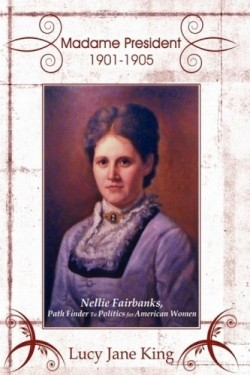Madame President, 1901-1905
Nellie Fairbanks, Path Finder to Politics for American Women
Hilary Clinton came within reach of the U.S. presidency this year less than one hundred years after women secured the right to vote. Though women have yet to leap over this major threshold they can be found working hard in the Senate the House of Representatives heading state governments serving on the Supreme Court and blazing trails within the White House. The status women might achieve today is a far cry from the mainly domestic roles they were encouraged to inhabit at the turn of the last century.
Cornelia Fairbanks managed to rise above most women of her day; she served as president general of the Daughters of the American Revolution for two terms 1901—1905 and was believed to have worked closely with her husband Charles Fairbanks during his tenure as U.S. senator and vice president. Lucy Jane King author of From Under the Cloud at Seven Steeples offers an account of Nellie Fairbanks’ rise to power and the deeds she accomplished as head of the influential national club. Her most prominent achievement was the raising of funds for the construction of a national headquarters located close to heart of Washington D.C. Construction was begun during her time in office.
King is obviously passionate about her subject and her book is a product of thorough research. Unfortunately this passion does not quite translate into an enjoyable read. Madame President 1901-1905 strikes the reader as more like a register of accomplishments than the story of someone’s life. King excludes any hint of impropriety or mistake; even a scandal involving alcohol at a dinner party in the home of the abstinent Fairbanks is treated with defense and justification. Perhaps Fairbanks was as gracious tireless kind-hearted intelligent and diplomatic as she comes across in this book but that level of perfection is rare in the human population and does not endear her to readers.
Nellie Fairbanks’ character emerges most genuinely from her own letters and lecture transcripts. of which King includes several. In her letters to her husband she shows glimpses of a poetic nature; we also find clues about her failing health which eventually spiraled into the pneumonia that killed her.
Despite a subject that glows a little too brightly to be real King has contributed to the cause of women by bringing a lesser known role model to light. Those who hope every election to find a women’s name on the ballot may take comfort in Fairbanks’ success—she became a nationally recognized woman of power several years before she was able to vote alongside her husband.
Reviewed by
Andi Diehn
Disclosure: This article is not an endorsement, but a review. The publisher of this book provided free copies of the book and paid a small fee to have their book reviewed by a professional reviewer. Foreword Reviews and Clarion Reviews make no guarantee that the publisher will receive a positive review. Foreword Magazine, Inc. is disclosing this in accordance with the Federal Trade Commission’s 16 CFR, Part 255.

